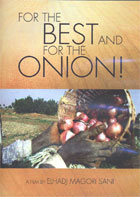
For the Best and for the Onion 2008
Distributed by Icarus Films, 32 Court St., 21st Floor, Brooklyn, NY 11201; 800-876-1710
Produced by Adalios
Directed by Elhadj Magori Sani
DVD, color, 52 min.
College - Adult
African Studies, Agriculture, Economy, Sociology
Date Entered: 12/02/2010
Reviewed by Janis Tyhurst, Reference Librarian, George Fox UniversityFarming has been around for centuries and the rhythms of agricultural life have not changed much in areas where farming is still done by manual labor. For the Best and for the Onion provides an intimate look at the lives of one African Muslim family in Galmi, Niger. Filmed as a vérité documentary, the story line is about a father, Yaro, who is unwilling to let his daughter, Salamatou, be married without “dignity,” meaning without an appropriate dowry. Unfortunately, farming is unpredictable, with some years providing bumper crops with good prices, while other years do not. Salamatou and her fiancé, Adamou, have already waited through one growing season when the documentary starts. The big question posed is will this season’s crop be sufficient to provide an adequate dowry.
The film follows Yaro as he starts his onion planting and fobs off the fiancé with a plea to be patient. Woven into the narrative are scenes from daily village life. As the planting season progresses, Yaro has hopes that this year the onion crop will bring in more money. The agricultural process is followed through the different growing stages until the onion buyer comes to look at the crop. He offers Yaro less money that Yaro had expected. Yaro declines to sell, hoping that the market price will pick up in a few weeks. By the time Yaro consents to sell, the onion market price has dropped by another third and the family of the fiancé, Adamou, is getting very impatient.
There are 7 chapters and several of them could be used to demonstrate aspects of a typical farming life in Niger/West Africa. The chapters Seeds, Water and Harvesting deal with the farming techniques in use. The chapters Wedding Plans, Advice and Wedding will be of interest to sociology classes and African studies classes. Overall, this documentary will be of interest to classes in West African studies, rural agriculture or African sociology.
The film cinematography and sound are good, the aspects of village and farming life are realistic and the story line is very plausible. The only drawback is that the English subtitles can be hard to read at various points in the documentary.
Awards
- Best Short Documentary, 2010 Pan African Film & Arts Festival (Los Angeles)
- Best Documentary Feature, 2009 African Movie Academy Awards
- Best Foreign Film Award, 2009 Terra di Tutti Film Festival (Italy)